
foreword | Historical Narratives | Resources | Links | Contact
UPPER CANADA'S LIEUTENANT-GOVERNORS AND THE COLONIAL OFFICE
History is the science of men in time..
 |
In Upper Canada the representative of Britain's Colonial Office was the lieutenant-governor. He was paid by and reported to the secretary of state who for a number of years was either the Secretary of State for Foreign Affairs or the Secretary of State for the Home Department. In 1801 largely for reasons of political convenience responsibility for the colonies was transferred to the Secretary of State for War a position created in 1794. When the Napoleonic Wars ended this secretary's responsibilities became focussed almost exclusively on colonial matters and the bureau became known simply as the Colonial Office.
For more than a hundred and twenty-five years, extending from the 18th into the 19th century the Colonial Office was located at 13-14 Downing Street in London. It operated out of two, crowded dilapidated buildings through whose basements the river Thames occasionally flowed. "There are rooms in the Colonial Office with old and meagre furniture, book-cases crammed newspapers, tables covered with baize and some old and faded chairs scattered about." Despite its damp and dilapidated quarters the Colonial Office determined the destiny of the lieutenant-governors and those they governed in British North America.
The British Archives bulge with the dusty files of Colonial Office correspondence containing letters of advice, admonition, praise and reproach as well as petitions from individuals and groups in the colonies who had interests to pursue or projects to protect. It was suggested that the official point of view of the secretary of state, might well have been summed in the words of advice allegedly given to a lieutenant-governor about to depart for one of the colonies. "Joy be with you and let us hear as little of you as possible."
Whether true or not the sentiment accurately reflected the relative indifference British officials and most Members of the Imperial Parliament displayed towards colonies and colonials. The public no longer cared about the Empire and left it to a few soldiers and civil servants to manage as best they could. |
Until Lord Bathurst succeeded to the office of the Secretary of State for War in 1812 no Secretary appears to have paid much attention to colonial problems. As New Brunswick's London agent lamented, "The Empire is so vast and we are so distant our affairs are but a bore." One prime minister was even less charitable about the empire referring "to those wretched colonies which are comparable to millstones round our necks." Colonial matters received attention from London when they assumed crisis proportions which had political repercussions in England. Only then was an inquiry likely to be conducted and the defects of Imperial administration exposed. When colonies were quiet their affairs were ignored and any abuses went unheeded by Parliament.
John Graves Simcoe, Upper Canada's first lieutenant-governor, failed utterly to follow the admonition to go and serve silently. Throughout his term of office he swamped his superiors at the Colonial Office with voluminous correspondence of tiresome length in which he sought "vigorous and systematic support">for his multitudinous projects and proposals. Although his superiors patiently replied to his many appeals and petitions, they were often non-committal or negative regarding the plans he proposed.
Simcoe's chronic inability to convince the Colonial Office to support his projects coupled with his ongoing disputes with Lord Dorchester, his superior in Canada, took their toll. He became despondent and depressed and finally requested a leave of absence for reasons of ill health. When a disappointed and disheartened Simcoe left Upper Canada most of the vigour and the vision left with him for his successors had none of his dreams and little of his drive and determination.
Governors were like kings in the colonies. As symbols of imperial power and control they were arrogant and self-sufficient presiding at the pinnacle of colonial society with amost absolute authority and influence. They were preoccupied with their own importance and frequently ignorant of or indifferent to local conditions and complaints. Even if they knew what these problems were they often left them unchanged. Executive, judicial and legislative powers were never exercised in a vacuum and by making changes it was too easy to anger or agitate one colonial faction or another. Because governors rarely received specific instructions from the Colonial Office as to how to carry out their responsibilities in the colonies they tended to be conservative in attitude and outlook. It was better to leave things as they were and limit any initiatives to routine, administrative matters. In this way they stirred up as little friction and discord as possible. Difficult or controversial matters were sent to the secretary of state in London for his advice, approval or rejection.
 |
In practice the lieutenant governor's authority was restricted by fears he might have for his own future. Most of the governors carefully monitored the moods they detected coming out of the Colonial Office and acted accordingly. Most of the Englishmen dispatched to the colonies had no personal or lasting commitment to Upper Canada and in all likelihood few would have come if they had been offered other positions. Compared to some imperial postings Upper Canada was an unknown backwater lacking both prestige and comfort. It was a wilderness to be ruled.In most cases they were largely ill-equipped to understand the local issues or to explain the needs of a North American society to the Colonial Office. Home to the governors was England to which they intended to return once they had served their sovereign in the backwoods. They served for a limited time before moving on to another more prestigious posting. The effectiveness of governors was limited, therefore, by the fact that they were only "birds of passage,"
 |
The Colonial Office was organized around the personality of the individual who held the office. Without staff to advise him or to recommend policies and procedures he relied for advice on whatever information he received from his officials in the field or from self-seeking pressure groups who wanted to change something in the colony. One lieutenant governor complained that the Colonial Secretary was constantly supplied with information by "irresponsible agents from Canada who were only too eager to pour into his weak and willing ears, stories about the lieutenant-governor's indifference to the sentiments of the people of Upper Canada." Parliament and the British people's attitude seemed to be summed up in the London Chronicle's observation that "the colonies were acquired with no other view than to be a convenience to us and therefore it can never be imagined that we are to consult their interests instead of our own."
In order to access the "weak and willing ears" of the Colonial Secretary each of the former 13 American colonies had retained agents in Britain. These individuals were paid representatives whose job it was to keep their particular colony informed as to what was going on in London and in Parliament. If a colony were interested in some case before the Privy Council or in some administrative or political matter under consideration by a ministry the colony's agent monitored events closely and reported these back to the colony's officials. The agent not only kept the colony well informed about events in England, he also lobbied on behalf of the colony. These agents included such illustrious individuals as Benjamin Franklin and Edmund Burke.
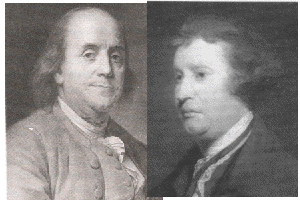 |
|
Franklin & Burke |
In 1816 Upper Canada's legislature voted a salary for a provincial agent to reside in London and represent Upper Canadian interests. When Governor Gore promptly appointed his own secretary to this position people in the province were disappointed for they knew the governor would exercise close control over the agent, monitored his every action and interpreted his reports to suit the interests of the governor and not necessarily those of the colony.
Prior to the American Revolution each of the 13 Colonies had a governor and it is interesting to note the American perception of these British officials. "The royal governors were almost always a source of grievance to the Americans. These autocrats were usually military men and members of the upper class. Because they were in the Crown's good graces and were frequently owed a favour their appointment was a form of political patronage. Most recipients treated their appointment either as a sinecure or as an opportunity to enrich themselves by land speculation or bribery."
The governors also controlled the courts. The judges they appointed usually served during 'good behaviour' which meant they retained their positions as long as they brought in verdicts favourable to the Crown. Failure to do so ensured a short tenure on the bench. American attitudes towards these judges was summed up in the following statement on their judgements. "Americans who appeared before these political toadies, so pompous and patronizing in their white wigs and black robes, believed they had little hope of justice."With the notable exception of Simcoe the officials sent to Upper Canada did not generally display much real interest in the welfare of the colonists or in the improvement of the colony. These representative of the crown brooked no interference from the elected Assembly. Controlled largely by their London superiors most of the governors were satisfied simply to draw their salaries, seek the king's approbation and receive another appointment when their term was finished. By that test and that test alone they were judged by their superiors.
One lieutenant governor, Francis Gore protested that this kind of conduct was not always his fault. After he retired Gore complained about his inability to influence events or to earn praise for any of the new initiatives he undertook in Upper Canada. In a letter to Bishop John Strachan dated 19th of January, 1818 Gore complained that there was
In His Own Words"No prospect of reaping public praise from public exertion. One is caught between the military government in Canada and Colonial despotism in England. Both thwarted my wishes and maligned my motives. Any initiatives would have been stifled by Downing Street unless perverted to their own credit. I have not discovered anyone in London who feels the least interest in Upper Canada."
To some extent Gore's problems may have stemmed more from his personality than from other people for he gave offence to a good many inhabitants in Upper Canada. According to historian Henry Scadding, Gore was "plainly of the type of English squire of a former day with a cavalier style distasteful to many."
When Gore returned to England on a leave of absence Major-General Isaac Brock was his replacement. Brock discovered that he had no difficulty whatsoever with those individuals whom Gore had severely criticized.
On the contrary, Brock reported
In His Own Words
"The most powerful opponents of Governor Gore's administration take the lead on the present occasion. Some evidently opposed Mr. Gore from personal motives but never forfeited the right of being numbered among the most loyal."
 |
|
Francis Gore |
Despite his unpopularity when Governor Gore returned to York from his leave of absence he was well received according to an article in the September 30th issue of the Gazette."His Excellency Francis Gore, Esq. resumed the reins of government and was received with a cordial welcome and all the honours due his rank. He was saluted by cannons on HMS Montreal and those at the Garrison." However, Gore's genial reception is hardly surprising since he held the keys to power, patronage and promotion. No ambitious citizen in his right mind would fail to offer anything but a smiling face and a deep bow to the Governor. When Gore finished his second tour of duty in 1817, he reported on returning to England that he had left Upper Canada "in a spirit of union and conciliation." Gore's rosy report was less than truthful. He left a legislature whose members were angry at being treated like ciphers by an arbitrary governor. Gore considered the Assembly was exceeding its prerogatives and used any opportunity to ignore or override its decisions. A confrontation was brewing and about to boil over between the elected and the appointed bodies.
Sometimes the interference regarding colonial affairs came directly from far off London. Governor General Lord Dorchester, whose services to the Crown were long and distinguished, bristled at the bureaucratic restrictions placed on him by officials in London, who, he said, had limited knowledge of local conditions. When Dorchester was mildly reprimanded for making a controversial speech to a council of Native chiefs he resigned in a huff, declaring angrily that he was fed up with
In His Own Words"the present political influenza. I sincerely hope my replacement would have authority sufficient to carry on the King's services, both civil and military."
The widespread existence of patronage in colonial appointments often meant the appointees were largely unfitted for their task. Weaknesses in the system were made worse by the individuals chosen to operate it. Governors were selected not because of any special aptitude for or knowledge about the colony but for reasons usually unrelated to the interests of the colony to which they were being sent.
Canada was won by the sword and governed by men of the sword. Those who ruled Canada were veterans of the Seven Years' War, the Revolutionary War and various battles with France. Later they became the Duke of Wellington's worthies, officers who served under Wellington during the Peninsular War and most importantly at Waterloo. Years after this great battle it was still being proclaimed:
Were you at Waterloo?
I have been at Waterloo.
'Tis no matter what you do,
If you have been at Wateroo.
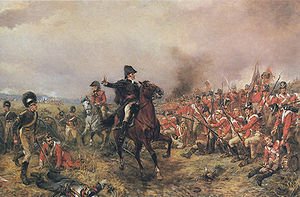 |
|
Wellington at Waterloo by Robert Alexander Hillingford (1825-1904) |
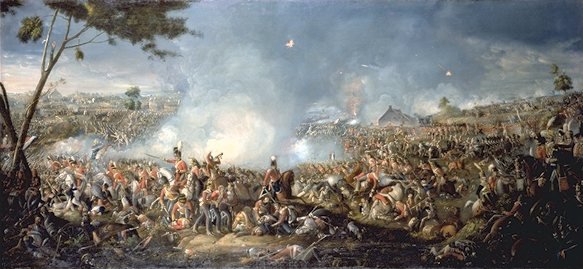 |
|
Battle of Waterloo by William Sadler (1782-1839). |
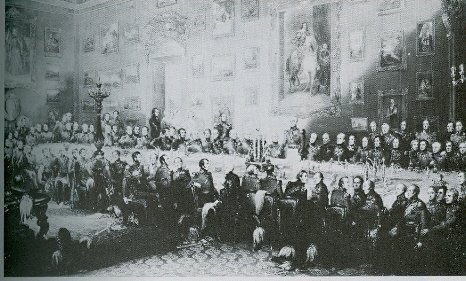 |
|
Wellington Addressing His Worthies. |
These men had little interest and less knowledge to shape with understanding the development of a political society. They sought to keep control denouncing as disloyal rebels any who favoured the growth of liberal ideas, ideas in which England herself was setting the example. To these autocrats democracy was satanic. These arbitrary and autocratic military men were completely unsuited to serve as civil administrators in colonies inhabited by free English people. Their unsuitability became more critical as colonists grew increasingly more knowledgeable about their colony's needs and the inadequacies of the men who held the reins of power.
British politicians failed to understand that the old system of imperial control no longer served the more developed colonial societies. Preoccupied only with appeasing the Imperial parliament British politicians and local governors simply ignored the interests of anyone who was not well connected with parliament or the British government. During and after the Napoleonic War it was the practice of the British government to appoint as governors 'Waterloo Warriors,' officers who had served under the Duke of Wellington, the 'Iron Duke' in the Peninsular War or at the Battle of Waterloo. This latter battle was of great significance and for the first time in the history of the British military Waterloo veterans were awarded commemorative medals. Service on the 18th of June 1815 was worth two years' service for pension purposes.
Officers who served in this battle became national heroes who had to be rewarded for their valour. For nearly half a century Wellington's warriors were rewarded with appointments as lieutenant governors in Upper Canada. It was believed that they were men "who from their strength and position could command the confidence of the people of the province." Experienced only in military affairs these wealthy, aristocratic officers expected to be obeyed and to dominate the colonial government because they represented the force of law and tradition. They were at the head of the colony's social hierarchy in which everyone had a place and was expected to stay in it.
One such military man was Sir Peregrine Maitland, one of the Iron Duke's generals. Maitland was appointed lieutenant-governor of Upper Canada over the objections of the Colonial Secretary, Lord Grey, who declared that he was "never a man of great ability" and should "have been retired." Maitland maintained that his only duty was to "fulfill the wishes and expectations of my Sovereign." His arrogant, autocratic manner was illustrated on one occasion when a committee of Upper Canada's House of Assembly summoned the Superintendent of Indian Affairs and the Adjutant-General to appear before it. Before doing so these two men requested authorization from Maitland. Maitland, who was in a fit of pique over something Members of the Assembly had done, petulantly refused to give his permission to the two men. This resulted in the two officials being arrested by the House of Assembly's Sergeant-at-Arms for disobedience and held in the common gaol until the session was over. When news of this petty posturing reached the Colonial Office, Maitland was severely censured and subsequently removed from office, much to the satisfaction of most of the citizens of York.
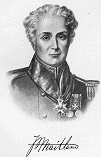 |
|
Sir Peregrine Maitland |
While some military men received their positions as rewards for distinguished military service, others were appointed because they were owed a favour by the party in power. Knowledge of the office and familiarity with the colony and its concerns were of no matter. During Maitland's tenure a petition was raised by a number of members of the Reform party which set forth a long list of grievances, one of which complained of the "total ineptitude of military men for civil rule in this province." Although Maitland described it as an outrageous document it was forwarded to the Colonial Office where it was given a courteous but non-committal reception. A former Colonial Secretary explained that military men were appointed because qualified civilians would not go to the colonies. It was also stated that Upper Canada could not expect to have responsible government because it "could not be safely applied" in a colony situated on a frontier" so close to a republic. In such a vulnerable location the British government believed control had to be in the hands of a military governor for defensive reasons.
Military governors had few political or diplomatic skills and they held the extreme views of their aristocratic Tory class which was that the finer things in life should be only for those with prestige, property and influence. Often curt, cold and insensitive these officers lacked political judgement and common sense and reacted disdainfully to any opposition or insurgency either by ignoring or repressing it. They could not imagine any system of government that did not place the province directly under the control of the imperial authorities. Newly appointed governors came to Canada fully expecting to dominate the government and society. Egerton Ryerson described the lieutenant governor
In His Own Words"as an ultra-tory, a lordling in power, a tyrant in politics and a bigot in religion."
Another writer described them as "pinchbeck aristocracy," lesser lords or simply military officers who assumed superior airs and kept arrogantly apart from the colonial community of backwoodsmen whom they considered their inferiors. They were heedless of any developing currents of reform in the colony and determined to run "a tight ship,"seeking only to serve faithfully their sovereign and his government in London. They protected their prerogatives and rights from the ever-encroaching Assembly by throwing themselves into the arms of the legislative and executive councils from whom they derived their convictions about local affairs. Within this close-knit clique or compact they insolated themselves from the rest of colonial society. Few of them had the Carleton-touch of confidence in the people.
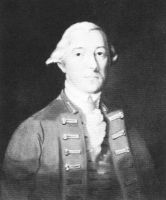 |
|
Sir Guy Carleton |
Colonists had little remedy against the incompetence or indifference of these imperial officials. Despite their inadequacies or ineptness negligent officials were rarely recalled unless they were found to be guilty of the grossest stupidity or misconduct and sometimes even then they were allowed to retain their position. Outright dismissal from office was rare and some governors continued to hold office for years even after they had left the colony with no intention of returning. Governors appointed to succeed bungling or incompetent officials often simply followed the same policies as their predecessors. According to one close observer Canada was in danger of becoming a "recreation for British officials."
The appointment of Sir Francis Bond Head was called "the most bizarre and hapless one ever made to a Canadian office by the British government." He was the most headstrong and least obedient of the lieutenant-governors in the 1830s. At the time the tense political situation in Upper Canada required a wise conciliator it received instead a headstrong, obstinate, inept individual intent on provoking problems. Head saw himself as a heroic figure, a kind of knight appointed to save Upper Canada for king and empire. By his own naive admission he knew nothing about colonial affairs and confessed that "nothing could be more uncongenial to his habits, dispositions and opinions" than the position offered to him.
 |
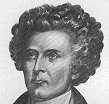 |
|
Sir Francis Bond Head |
Head completely disregarded the Colonial Secretary's clear instructions to him before he left London to be responsive and conciliatory towards the Reformers. Instead he confronted them head on and his confrontational approach led to rebellion. Head avoided dismissal only by resigning. When he returned to London he was outraged by the absence of any expression of thanks or appreciation for his work in the colony. He finally sought an early morning meeting with the Prime Minister, Lord Melbourne, who was shaving at the time. After airing his complaints and criticisms, Head exclaimed in frustration that he had after all saved Upper Canada for England.
The prime minister, who had listened patiently to his rant, then turned to Head and said,In His Own Words
"Yes, but Head, you're such a damned odd fellow."
Ineptitude was not confined solely to officials in the field. Allegations of incompetence were directed also at the secretaries of state themselves, one of whom, the Duke of Portland, was the subject of much criticism in the latter part of his career. He was described as a man without conspicuous ability who possessed to an eminent degree "the talent of total silence." As prime minister he frequently slept through cabinet meetings missing out completely on what had been discussed. He was anonymously described with doggerel in a satirical newspaper.
"He totters on a crutch,
His brain, by sickness, long depressed,
Has lost the sense it once possessed.
Though that's not saying much."
Successors to Simcoe
The following was published in the Gazette of September 11, 1796. "His most gracious Majesty has been pleased to grant his royal leave of absence to his Excellency Major-General Simcoe." In Simcoe's temporary absence the grave, portly, powdered Peter Russell, a Legislative and Executive Councillor, was appointed to fill what was considered to be a provisional vacancy.
2.The Honourable Peter Russell (b.1733-d.1808)
Russell was appointed president in 1796 and served as administrator of the province until 1799. When Russell learned that Simcoe would not be returning to the province he implored Simcoe to put in a good word for his appointment as lieutenant governor. Simcoe replied to his appeals on 5th June, 1798. "I can assure you that I have done my utmost to comply with your wishes. I am told by the Duke of Portland that my recommendation will have great weight, whenever it shall be necessary to appoint my successor." If Simcoe did, in fact, recommended Russell, it was to no avail for Russell never received the coveted appointment and served as administrator only until a new lieutenant governor was appointed. The Colonial Secretary advised Russell that in his acting capacity he was entitled to half of the salary of the governor and half of any fees his office earned. Simcoe, who retained the title lieutenant governor, received the other half of the salary for the position. Partly for financial reasons Russell granted himself a commission as a puisne judge although he had neither legal training nor qualifications for the job. Many including the Colonial Office felt this was improper and Russell received a reprimand. He was told his action was "an impropriety." Russell was broken hearted when he was informed that Peter Hunter had been appointed lieutenant governor.
3.Peter Hunter (b.1746-d.Aug.21st,1805)
Hunter served as Lieutenant-Governor from 1799 to 1805. He also served as commander-in-chief of all military forces in Lower Canada. The Honourable Peter Hunter arrived at York in August, 1799 on the schooner Speedy. On landing "he was received by a guard of Queen's Rangers and at one o'clock p.m. was met at President Russell's home by the military officers and congratulated on his safe arrival and appointment to the government of the Province." Curt, cold and insensitive Hunter was a military officer more accustomed to autocratically ordering his officers about than praising and encouraging them. He was determined to run a tight ship and adopted an overbearing behaviour towards his subordinates in York. One was William Jarvis, Provincial Secretary, whom he publicly humiliated and reduced to tears. When the schooner Speedy was lost on Lake Ontario with the most important figures in the justice system of Upper Canada, it was considered "a disaster felt by the Bench, the Bar, Society, the Legislature and the Country." The vessel vanished in a storm on the lake taking with her the accused, his jailer, the judge, the lawyers and all the other passengers. In spite of requests to order an inquiry into the sinking of the schooner, Hunter decided it was not necessary. When, however, it was discovered that there was a shortage of two ounces of rum in the ration given to seaman on board the Mohawk, Hunter appointed a special three-man court to inquire into the matter. Hunter's accomplishments while in office included building Government House, improving postal services, establishing a market and purchasing a fire engine for York. His military duties required him to be absent from York during most of his tenure as lieutenant-governor of Upper Canada. He died at Quebec in 1805.
4.Alexander Grant (b.1734-d.1813) Grant was President from 1805 to 1806). He was a senior member of Upper Canada's Executive Council to which he was appointed in 1792. When Governor Hunter died he was appointed administrator of the province for a brief period. Known throughout the province as 'Commodore,' Grant was connected with naval service most of his adult life. He was the first commodore of the western lakes with headquarters at a large dockyard at Detroit which accommodated nine vessels and their crews. As Commodore he had overall command of these vessels ranging from one hundred tons down. The ships carried up to fourteen guns. During his presidency seven acts were approved in the provincial parliament which extended from the 4th February to 3rd March, 1806. One act authorized the purchase of "certain apparatus for the promotion of science" for which 400 pounds were approved. The instruments were to be used for illustrating the principles of natural philosophy, a subject which today is known as science. When the instruments were received Grant presented them to Dr. John Strachan, a well-known teacher at Cornwal, for his use in instructing the youth of the province. The instruments were subsequently donated to Upper Canada College where they remain to this day at 'olde Upper Canada' as the graduates once called their Alma Mater.
5. Francis Gore
(b.1769-d.1852); Lieutenant-Governor for the period 1806-1811
6. Isaac Brock
(b.1769-d.1812); President, 1811-1812
7. Roger Hale Sheaffe, Esq.
(b.1763-d.1851); President, 1812-1813
8.Baron Francis De Rottenburg
(b.1757-d.1832) President June 19th to December 12th, 1813
9. Sir Gordon Drummond(b.1772-d.1854)
Provisional Lieutenant-Governor 1813-1814
10. Sir George Murray (b.1772-d.1846)
Provisional Lieutenant-Governor 1815-1815
11. Major-General Frederick Robinson
Provisional Lieutenant-Governor, 1st July, 1815-September, 1815
12. Francis Gore, Lieutenant-Governor, 25th September 1815-1817
[This was his second Administration.]
13. Colonel Samuel Smith (b.1756-d.1826)
President June 11th, 1817-August 12th, 1818
14. Sir Peregrine Maitland (b.1777-d.1854)
Lieutenant-Governor, August 18th, 1818-1828
15. Sir John Colborne, (b.1778-d.1863)
Lieutenant-Governor, November 1828-1836
Sir John Colborne was another of the 'Waterloo warriors,' one of the stars of the age who became a field marshal and a peer. He was one of Wellington's best Light Brigade officers. Colborne, who was over six feet tall, had a nose like an eagle's beak that was said to be second in size only to Wellington's own prominent snout. It was said that the omission of Colborne's name from Wellington's Waterloo Dispatches was surely an error for Colborne led the superbly dashing 52nd Regiment of Light Infantry "with bayonets flashing and bold and brilliant initiative." Sir Colborne was credited by some with assuring the victory at the Battle of Waterloo. During this battle Colborne's right arm was shattered by a cannon shot driven into the flesh. While he escaped amputation by the prompt action of a military surgeon, the gold braid of his epaulette became embedded in his flesh and had to be extracted bit by bit. Because of the pain involved Colborne could only bear it to be dug out five minutes at time over an extended period. The shoulder-joint seized up but he regained use of the arm below the elbow. While his limb was saved it was greatly disabled and its disfigurement was quite conspicuous.
Colborne was keenly interested in education and can be credited with the creation of Upper Canada College. Before his term expired Colborne oversaw the construction of a "high-class school" which was given the name Upper Canada College. He paid for this private school using revenues from public school reserve finances and money supposed to be used for a university. His autocratic action met with angry opposition from all sides. Tenders were printed in the Loyalist on May 2, 1829."Minor College. Sealed tenders for erecting a School House and four dwelling-houses will be received on the first Monday in June next." That building has long "gone to decay, but Upper Canada College itself flourishes with all the vigour of youth." The college opened its doors to scholars on Monday the 8th of January 1830 and the college continues to educate boys from Senior Kindergarten to Grade 12 to this day.
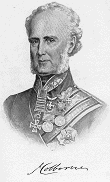 |
|
Sir John Colborne |
Soldiers suffered psychological as well as physical wounds. Colborne, one of Wellington's most senior and successful generals, admitted that after his serious wound he was so overwrought as to be unfit for service in the field.
In His Own Words"I was so nervous that I used to be obliged to say, 'Give me a glass of wine, I am going to cry.'"
He controlled himself in front of his men because he did not want them to think he was crying because of the pain of his wound.
It was under Colborne's administration that William Lyon Mackenzie's famous thirty-two grievances and resolutions were introduced to the upper Canada's House of Assembly.
 |
|
Mackenzie's 32 Grievances |
The principal grievances listed by Mackenzie were:
(a) The absence of local self-government;
(b) The instituting of criminal prosecutions for political libels at the instance of the Crown;
(c) The lack of independence of judges who held office during pleasure only. [This meant they could be dismissed at any time for any reason and it was suspected that often judicial decisions tended to be in accordance with the wishes of the authorities who made the appointment;
(d) The fact that sheriffs, who also held office during pleasure, were involved in the selection of juries;
(e) Patronage [the power to hand out jobs] exercised by the Crown and the Lieutenant-Governor of the Province should have been controlled by the Legislature;
(f) The fact that unpaid war losses (suffered as a result of the War of 1812) were being charged to the Provincial Government rather than to the Imperial Government;
(g)The absence of a protective system in the trade of the Province.
Colborne showed little interest in Mackenzie's grievances and gave his attention instead to matters of a more practical nature like education and roads which he felt were being neglected. When Colborne prorogued the parliamentary session he expressed regret
In His Own Words"That the people of the province will derive no immediate advantage from your deliberations on two subjects of primary importance: improvement of the Public schools and measures to ensure good roads and safe bridges throughout the province."
Colborne created a great deal more controversy with his last official act. Just prior to his departure he designated on the recommendation of the Executive Council 15,000 acres of clergy reserves and 6600 acres of crown lands specifically to endow 44 Anglican rectories across the province. Although the Governor was acting within the law Reformers and other moderates were enraged. This act was the last in a number of Colborne's controversial actions which added to the widespread opposition to his leadership. When word of his increasing unpopularity and the general unrest it was causing in the colony reached London Colborne was recalled early in 1836 by the Colonial Secretary Lord Glenelg.
When Colborne arrived in New York on his way home to England he was astounded to discover a dispatch there from Glenelg appointing him commander-in-chief of all military forces in the Canadas. He immediately took up his post in Quebec and commanded the forces that put down the rebellion in Lower Canada in 1837-38. Colborne served also as administrator of both Upper and Lower Canada before and after Lord Durham's mission in 1838-39. On Colborne's return to England at the end of 1839 he was rewarded with a peerage and became Baron Seaton.
16. Sir Francis Bond Head (b.1793-d.1875)
Lieutenant Governor, 23rd January, 1836-23rd March, 1838
17. Sir George Arthur (b.1784-d.1854)
served from 1838-1841.
The last lieutenant governor of Upper Canada, Arthur was described by one British official as well-intentioned but "with the narrowest mind I every met."
 |
|
Sir George Arthur |
Prior to coming to Canada Arthur had served as lieutenant governor of Britain's notorious penal colony in Van Diemen's Land. Some there praised his "humanity coupled with firmness" while others criticized his inhumanity as a "wholesale hangman." It was charged that he signed 260 death warrants in twelve years. His recall to England was hailed with joy by the residents of Van Dieman's Land. Arthur was rewarded for his activities in Van Diemen's Land with the office of lieutenant-governor of Upper Canada. He served during the difficult period immediately following Mackenzie's Rebellion. Assessments of his services in Upper Canada during this period differ. Some praise his moderation and humanity while others condemn his unnecessary severity to those involved in the Rebellion or suspected of disloyalty. Arthur is notorious for his decision to allow the execution of two guilty but highly-respected Upper Canadian reformers, Samuel Lount and Peter Matthews. Arthur made his decision in the face of thousands of petitions to spare the men and the fervent appeal on her knees of Mrs. Lount. While both men had been leaders in the rebellion, had held up the mails and been responsible indirectly for the death of citizens, their executions caused considerable public anger. Lount's death in particular intensified the already bitter feeling against the government for many including Lord Durham agreed with Egerton Ryerson, an influential Reformer, who placed the blame for the rebellion squarely on the previous lieutenant governor, Francis Bond Head.
In His Own Words"Sir Francis Bond Head deserves impeachment as much as Lount deserves execution. In fact, Head is the more guilty of the two."
Lieutenant governor Arthur vigorously opposed responsible government. He deeply resented Lord Durham and strongly disagreed with the recommendations in Durham's Report. Durham found Arthur "full of littleness about etiquette, precedence, official dignity, etc., all characteristics Arthur shared with most of his predecessors." Arthur's departure from Upper Canada was un-mourned.
Numerous complaints about the inadequacies of representative government resulted in frequent confrontations between the Governor, the Executive Council and the Assembly. Because of the limitations of the Constitutional Act the Assembly was confined merely to making laws. Its members then looking on passively as those laws were either implemented or ignored by the governor and the Executive Council. The governor and the Executive Council exercised power without regard for the wishes of the representatives of the people or the people themselves - the "uneducated multitude."
Members of the Assembly felt their task was not simply to talk and rubber-stamp government resolutions. They believed they had been elected to serve the people of the province who sent them to the Assembly by acting to implement decisions that would advance the wishes of the people. Their inability to do so resulted in disappointment and growing discontent because the "uncompromising courtiers of the family compact" dominated the governor and the government.
The Assembly's futile opposition to this entrenched establishment led to widespread frustration, disputes and demonstrations. This bitterness resulted in inflammatory language which created deep divisions in a colony many people believed was regularly misruled. Upper Canada's "ample and fertile territories"were in a backward almost destitute state, its poverty and stagnation contrasting sharply with the relative prosperity which existed in the United States. A visitor to Toronto during this period said she discovered there "a hateful, factious spirit"which was completely devoid of any generous principles of policy. She described Upper Canada as "a colony not a country and Britain not a real mother. The cold, narrow minds, the confused ideas and the by-gone prejudices of the society are hardly conceivable." Toronto's arrogant, office-holding, self-seeking, oligarchy became the chief target of attack by frustrated reformers whose exasperated fury with "the favoured few" finally exploded into rebellion.
"The future historian of Canada will marvel not that an ignorant people rebelled but that they so long quietly submitted to outrages against the law, decency and commonsense. He will drop a tear over the fate of Lount, Matthews and Moreau [all executed] and his blood will freeze within him that anyone could be unmoved by the cries for mercy from thirty thousand of his fellow-subjects."
News of the rebellions of 1837, coming as they did at the beginning of the reign of young Queen Victoria caused Prime Minister Lord Melbourne consternation, bewilderment and embarrassment despite the fact that numerous earlier complaints had received little attention from London.
 |
|
Prime Minister Lord Melbourne |
The latest of these complaints had been taken to London by Charles Duncombe who had been delegated to go to England on behalf of Reformers with complaints against alleged corruption and interference in the election by Lieutenant-governor Bond Head. Arriving in London in September, 1836 Duncombe had the reform charges laid before the House of Commons but the Colonial Secretary, Lord Glenelg, refused to grant him an interview. This was a devastating experience for Duncombe, a moderate reformer, who had always na´vely had faith in British justice. He was convinced that troubles in Canada were caused by domestic misrule and if the British government were made aware of the true situation they would act to rectify it. Duncombe became sharply disillusioned by his indifferent treatment in London. This is considered by some to be a major cause of the rebellions that followed his return home.
In a letter to Robert Baldwin, Duncombe wrote
In His Own Words"If ever Canadians are to have good government they must look among themselves for the means of producing it." Events were beginning to reflect the passions of an awakened people.
When Lord Melbourne received news of the rebellions he was angered and dismayed. He expressed impatience with the whole Canadian business.
In His Own Words,"The French population is entirely hostile and ready to rise whenever called upon; the frontier is thronged with refugees; the Americans are always ready to assist rebellion and the English population is loyal according to their own fancy and on condition that they have their way in everything." The prime minister looked about for a scapegoat on whom to blame the failure of his policy and found one in Lord Glenelg, the colonial minister, who was promptly sacrificed and sacked. Now whom could he find to resolve the pesky Canadian colonies' conflicts?
Copyright © 2013 Website Administrator